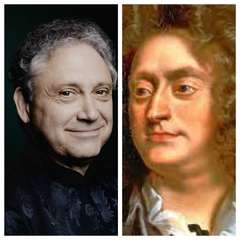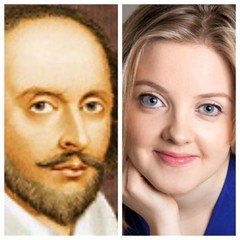|
Back
Restoration Resplendence New York
Naumberg Bandshell, Central Park
07/20/2021 - & July 18, 2021 (Caramoor)
Christopher Gibbons: Fantasy in A minor
John Blow: Three songs: Welcome, Welcome Every Guest, from Ampion Anglicus – Peaceful Is He and Most Secure – Lovely Selina
Matthew Locke: Curtain Tune from The Tempest
Henry Purcell: Three songs: The Blessed Virgin’s Expostulation, Z.196 – Music for a While, Z.583 – Bess of Bedlam, Z. 370 – Chaconne from King Arthur – Fairy Queen selections: Second Musik; Aire; Rondeau; “If Love’s a Sweet Passion”; Dance for the Fairies; Dance of the Haymakers; Monkey Dance; Symphony; The Plaint: “O let me weep”; Third Act Tune; Hornpipe; A dance of the Followers of Night; “See, Even Night Herself”; Prelude; “Hark the Echoing Air”; Chaconne
Rowan Pierce (soprano)
Philharmonia Baroque Orchestra, Richard Egarr (conductor and harpsichordist)

R. Egarr/H. Purcell (© Courtesy of the artist)
“British 17th Century music has a quirky wit. It’s kind of Monty Python-esque.”
Richard Egarr in conversation with Caramoor Music Director Kathy Schuman
“Purcell was so superior to all his predecessors, that his compositions seemed to speak a new language; yet it was universally understood. His songs seem to contain whatever the ear could then wish or heart to feel.”
Charles Burney A General History of Music (1796)
Ah, if only the conductor Richard Egarr had paid more attention to that 18th Century savant Charles Burney last night. Mr. Egarr led youthful Olde Musicke group, Philharmonia Baroque Orchestra (P.B.O.) from the harpsichord: both he and his virtuosos were technically fascinating, Yet the first music, from Purcell’s near contemporaries seemed lost in the open-air depths of Naumberg Bandshell.
Partly these were audio problems. Perhaps at Caramoor’s Venetian Theater tent on Sunday, the voices were clearer. However, the Naumberg Bandshell was built more than a century ago for, yes, band concerts. And their first performances of Sousa, Tchaikovsky and Johann Strauss, must have resounded. But the delicate Gallic strains of John Blow, the academic fugal notes or Christopher Gibbons hardly pummeled the ears of the audience, some of whom walked out after a few measures.
After all, with free seats, they could “try it out” before going to more beguiling tunes.
Mr. Egarr tried his best to make the case for Matthew Locke’s Tempest music. And perhaps 350 years ago, such understated violence had its effect. Yet in our times of musical dissonance and meteorological mayhem, Locke’s attempts at physicality were lost.
The other problem was that, while these composers would be satisfactory for a gossipy 17th Century London audience, their appearance here, before Henry Purcell showed they were period pieces. Caviar for polite Baroque partisans, but “stuff to get through” for the rest.
So happily, happily (as a British librettist might have written) Mr. Egarr and the Baroque Philharmonic skipped over the opening broth to the mutton chops of Henry Purcell.
Both British-born Richard Egarr and the American-born P.B.O. were ideal here. Those who know him from Juilliard praise his ebullience, his humor (see quote above), his vast knowledge and his keyboard acumen. He had large shoes to fill last year from the equally scholarly-jaunty Nicholas McGegan, but the strings (including theorbo) were adept and colorful.
The three opening Purcell songs, including the fierce Bess of Bedlam had two benefits. First, those bright emotional tunes by Purcell. Second, the equally bright polished soprano voice of Rowen Pierce. Even in the vast auditorium of Naumberg Bandshell, Ms. Pierce made every word distinct, each phase became an act of its own.

W. Shakespeare/R. Pierce (© Courtesy of the artist)
Perhaps pairing Shakespeare with Rowan Pierce iwas a musicological error. After all, Midsummer Night’s Dream has as much in common with Fairy Queen as Champagne with Dr. Pepper. (The original was hardly ever played in Restoration England, leaving a Bowdlerized play, and these few masques from Titania’s imagination, without a word of the Bard.)
On the other hand, Purcell caught the lightness and dream-like imagination of Shakespeare with stunning loveliness. Her Second Air from Fairy Queen had the pathos and melodic tragedy of Dido’s Air. The other music could easily have been employed by Mendelssohn’s Dream. And even Benjamin Britten’s Dream had that same resonance.
For those who left early, or others who wolfed down fat sandwiches during this second half, one must have pity. This was music which Richard Egarr and the P.B.O. outdid themselves. Yes, the volume was more voluminous (even the chaconnes surpassed Britten’s transcriptions). Ms. Pierce radiantly showed Purcell’s dictum that “words and music are part of the same person.”
But it was Henry Purcell himself, especially in relation to the other composers here, displayed with pungency, wit, with gorgeous melodies and the most vivid painting of words with notes.
Harry Rolnick
|